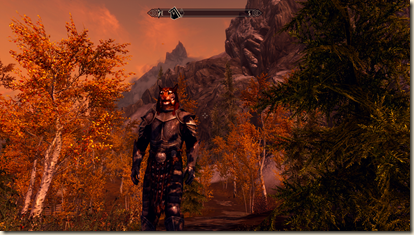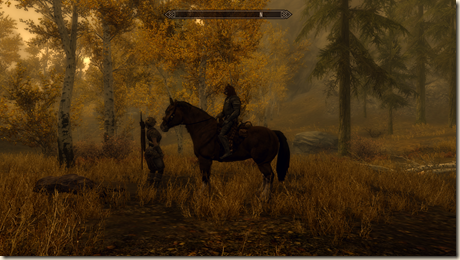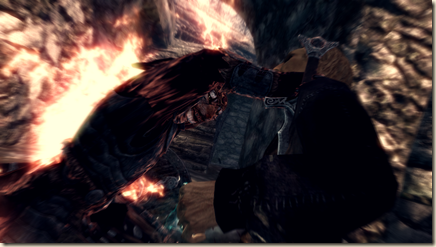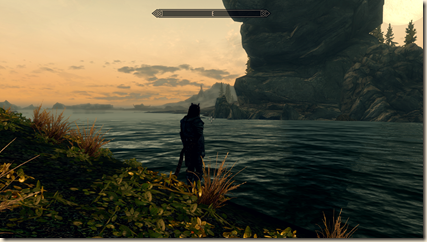
I have recently started playing The Elder Scrolls: Skyrim and I have found it… an INCREDIBLY engrossing game. For the first time ever since I played the Ultima games as a teenager have I felt that a team out there has put enough effort to make an actual story and world. Not just pretty mechanics and dazzling looks, but rather done its best to integrate everything into a narrative experience within the limits of our technology.
The reason I like games, you see, is because of story. The medium is different than others because it allows the player to be the protagonist, not merely a spectator. This comes with advantages and disadvantages: immersion, which can be crippled by bad storytelling or inept technology…. the wrong kind of story (allowing the player to make choices is better than to take away the ability to choose, for example) or an inept implementation can ruin the whole package. The reason I loved the Ultima series (up to VII… VIII and IX are the chapters I pretend never happened, thanks to EA’s intervention) was because, even with the limited technology of their time, they were able to tell compelling stories where you (the player) were part of an epic quest to become a paragon of virtue, and your subsequent adventures were spent in the pursue and preservation of those virtues (or, that is, virtues as they were understood in that world.)
To Virtue or Not To Virtue

Since the last true Ultima (Ultima VII, in my opinion), no other series has been able to fully realize the moral significance of virtue in a world—many games implement ‘moral choices’, but the choices are insultingly insane, amounting to “Do you want to give X a cookie, or punch her in the face and laugh?”
In games such as Fallout 3 or the Star Wars roleplaying games, the character choices range between the game society’s conception of virtuous good (which isn’t necessarily in harmony with the objective definition of such actions) and psychopathically evil bordering on the edge of sheer insanity. An example: In Fallout 3, a post-apocalyptic dystopia, the player is in a town (Megaton) which, at its center, has an unexploded nuclear device. The player is approached by a shady character and he has the option to A) work with the shady character to detonate the bomb and killing everyone and destroying everything in it because his boss considers the town ‘a blight in the landscape’ or B) Refuse, report him to the Sheriff and then kill the man for not only clearly willingly working towards mass murder, but also for trying to kill the Sheriff as well (a tricky option, you have to be very fast to kill him before he kills the Sheriff.)
While this clearly does afford the player a choice, it is an insulting one by clearly painting an almost disfigured portrait of how good and evil come about. Most of the virtuous or good actions the player can choose are usually tied to a solid context: in helping Megaton, the player helps his own chances of survival in the Wasteland. But what does an evil character think he gains from the mass destruction of Megaton?
Game critic and creator Ben “Yahtzee” Croshaw nailed the issue dead in the head when he said:
"Look, if you have two equally viable, equally difficult solutions to a problem- say, humanely suffocating your costly vegetative wife with a pillow or digging through to her femoral arteries with a cheese grater, the evil option (which, if you haven't been keeping up is the second one), is just irrational. You simply can't relate to a character whose actions don't make any ****ing sense."
What would the Vault Dweller gain in blowing up a whole town? Aside from the moral wrongness of mass homicide (which is something I don’t need to point out, do I?) even an unprincipled, evil character would have more use out of a settlement than a crater. In a post-apocalyptic dystopia, every settlement is a haven from raiders, disease, and a potential source of resources. Wiping such a place from the face of the earth isn’t merely evil- it isn’t just irrational, but ludicrous, which is why the choice feels absurd- only a character who is not only past the horizon of insanity but who is also accelerating quickly towards a whole new frontier would be capable of a choice like that—and what is the point of it?
A truly evil character would have, instead, found a way to insinuate himself into the structure of Megaton and its vital resources/administration, he would have built a cadre of people around him… and, in the end, made himself indispensable to Megaton. He would exact heavy rules and force against its inhabitants—demanding favors, tithes and similar in exchange for the privilege of using the life-sustaining resources. Hence, a truly evil character wouldn’t wipe Megaton from the face of the earth, he would enslave it. It is obvious that this is a more nuanced approach, and thus harder to pull off. Resorting to the caricature of madness may be more dramatic in the short-term, but it robs the storyline of the potential of having a true, wide-ranging, evil. The caricature of evil is dissociated from context, making it temporarily dramatic, but giving it little long-term relevance. In Into the Woods, a musical by Stephen Sondheim, the Witch points out (in a deleted song) “Evil, Evil? Do you know what’s evil? Nice peoples’ lies!” Sondheim is a master of delving into the consequences of performing evil deeds for good intentions, and he knows that there is nothing more chilling and more horrible than the ‘good’ actions of someone who is working towards ‘the greater good’ and sees individuals as nothing more than a means to an end.
True evil isn’t a cackling wizard looming from the parapet of a tower, it is the legislator who signs away the freedom of his people because he believes he knows what is best for them—something Richard Garriott showed us quite powerfully in Ultima V: Warriors of Destiny, where Lord Blackthorn (in the absence of Lord British) turns Britannia into a police state under the pretense of enforcing virtue. That is the power of story when it is unfettered from clichés. And it is one thing that Skyrim is actually doing very well.
The Septim Has Two Sides

Skyrim does have its moments where the player character is stuck between a rational choice and an irrational one, but those are not the bulk of the game. The game’s overarching plot rests on the conflict between the rebel faction and the Cyrodillian Empire, and you must make a choice between them—not because you are forced to by artifical narrative, but because a civil war is imminent and everyone will have to eventually choose whom to side with- it is inevitable, one can only plug his ears for so long to ignore the world crashing down around you. Eventually, you will have to move in a direction to avoid the incoming collapse… or remain in denial and be crushed.
Neither faction, however, is a paragon of virtue. The Cyrodillian Empire is plagued with problems- some of its officers have a fetish for carrying out sentences without a trial, they are occupiers much like the Roman Empire, and have banned the cult of a local deity. On the other hand, the banning of the cult of Talos came to be after the Empire capitulated in the war against the invading Aldmeri Dominion- a nation of elves wanting to establish superiority over humans. The ban was part of the conditions demanded by the Aldmeri, who had superiority at the time of the war. Nevertheless, it seems that the Empire is the only thing keeping the Aldmeri nation from swarming the known world- even if they may not have the resources to win (hence the capitulation), it probably would cost the Aldmer a rather steep price to topple the Empire in a full-out conflict. The Empire may be in steep decline, but it still allows its citizens some basic freedoms (except for those stripped during the White Gold treatise) and the benefits of commerce and protection.
The Stormcloaks, the rebels, on the other hand, seem to have a rightful claim: They seek to defeat the Imperial Legion that controls most of Skyrim and end the Empire's rule over the land. Skyrim was Nord territory before the Empire arrived, and the Stormcloaks wish nothing more than to reclaim it. Their leader, however, Ulfric Stormcloak, stains much of the movement’s motives. Ulfric, in an effort to ignite an uprising against the Empire's rule over Skyrim, assassinated the High King of Skyrim. We later learn, when speaking to his widow, that the High King respected Ulfric greatly and that if Stormcloak had asked him to do so, the King would have cast his lot in favor of the independence movement. The way it is explained, it is impossible that Ulfric did not know this—yet he resorted to brutality in order to strike controversy for his movement and cast himself in the role of the tragic outlaw and rebel hero (most likely in the hopes of attaining High Kingship if his movement won.) It is clear that Ulfric did not wish to share power, and he did not wish to see High King Torygg on the throne- but rather himself.
Further damaging Ulfric’s cause is a serious racist streak: His treatment of non-Nords in his Hold is appalling. The Dunmer (elves of dark-grey skin color) are sequestered into a portion of the city called the Gray Quarter, essentially they are forced to live in the city's slums. Some of Ulfric’s own subjects even reveal that he refuses to send aid to caravans and towns that have been victims of bandit raids within his hold if the victims were non-Nords. The Dunmer population of the city unanimously and quite vocally accept the Empire over Ulfric—and little wonder: while the Empire officials may be prejudiced, non-Imperial races have recourse to law and protection (though that it inself is also not a given 100% of the time, as seen in the introduction.)
Under Ulfric’s rule, Skyrim might turn from cultural hostility towards non-Nords and into full physical hostility. While the Stormcloaks have a claim based on invaded territory, they ultimately lose their standing due to the stance of their leader and the individual rights of its populace, Nord and otherwise. Of the two, it is the Empire that respects the most individual rights- even if it violates others. A Stormcloak Skyrim would necessarily become a land where only a Nord has rights.
Nevertheless, this choice for the player is not of the ridiculous nature of the mentioned examples- bake cookies or kick puppies. The player is presented with two options that are close to real-world issues, and although the Empire is more rights-respecting as a government can be in the Elder Scrolls world (while the egregious violation of religious freedom is a violation, it is essentially a policy that was forced into under the duress of war, and which is enforced by the Aldmer- here it is the Empire that is being coerced) , one can see how someone with certain political ideas (collectivism, for example) would root for the Stormcloaks, a faction that promises freedom for the Nords (the clan) exclusively, and being less than friendly to the ‘outsiders.’ There’s quite a real-world and historical precedent for that kind of choice- the idea that ‘some men are more equal than others’ as an execution of policy is quite common in the more authoritarian governments.
It’s definitely a more politically nuanced choice than in the Star Wars: Knights of The Old Republic games, where one’s choice ends up being tantamount to either joining the Hello Kitty Fanclub or the Puppy Kickers Incorporated. Here, it is essentially a choice of what the player’s character (which doesn’t necessarily have to exactly mirror the player’s values in the context of playing the role of a character in an alien world) values more. The consequences of choosing the Empire means supporting a compromising semi-free government that stifles freedom of expression to pacify a bigger, hostile threat. Choosing the Stormcloaks means that Skyrim attains independence from the Empire, but it also means that all the Khajiit, Argonians, Dunmer, Redguards and others within its domains will find life to be very, very difficult under the ‘Skyrim is for the Nords’ movement—and there, of course, is the possibility that the Aldmer will invade Skyrim if the Empire retreats. With those two potential scenarios, the player’s character must ask itself which of the two scenarios is more likely to lead to an end that is the closest to his own values- and whether or not he will be able to change things for the better once his preferred faction assumes power (which is outside of the scope of the game itself, but which realistically would be a consideration of the character.)
Taking out attention off the overarching plot, I want to discuss one of the minor quibbles I have. One rather contrived choice (a side-quest that was not linked to the main quest of the game) I came upon was the case of Grelod the Kind, an elderly woman who runs an orphanage. In the city of Windhelm you come across an escaped orphan who tells you how awful Grelod the Kind is to the children, and he wishes to see her dead… which he wants to do by summoning the Dark Brotherhood, a secret guild of assassins (he mistakes you for one of them, and you don’t do much to dispel his assumptions.)
If you travel to the city of Riften where the orphanage is, you will see that the city is crawling with corruption, and that the real master of the town is the Guild of Thieves, run by a woman called Maven Black-Friar. The allegedly actual ruler of the city, Jarl Laila Law-Giver, is convinced that she has things under her control. If you overhear her dialogue with her courtiers, it is made apparent that she doesn't find the Thieves Guild a problem, and her courtiers (Yes-men of the Guild) constantly assuage her concerns, telling her that nothing is wrong. Laila’s most trusted aide? Maven Black-Friar. So we are set up with a stage for disaster: The Jarl is a simple-minded idiot whose weakness enables corruption, and a spider woman runs the city. Just peachy.
When we go into the Orphanage, we find out that the complaints are not only true—they are worse. Grelod “The Kind” has a closer with child-sized manacles. She constantly beats the children and demands gratitude for the beatings, she tells them they will never be loved or adopted and that they will end up tossed into ‘the cruel world’ when they come of age—and she also actively prevents the children from getting adopted. Constance Michel is a girl who works as an assistant at the Orphanage, and is kind and loving to the children… but even she cannot counteract Grelod, the actual owner.
What is the player’s character to do? When returning to the Jarl, there is no option to talk to her about the orphanage. Presumably, because the Jarl is, again, an idiot who would most likely do nothing. Maven Black-Friar gains nothing in helping the orphanage (again, she is an evil character whose aim is to control others, much like Grelod herself,) so it is most likely that it would never be addressed. At the end of the day, the player is only left with two choices: Do something about Grelod The Kind, or walk away and leave the children doomed to a life of abject misery. Confronting Grelod simply shows the player that she is not afraid of him/her, is completely intractable to any arguments or intimidation, and the only choice if you want to help the children eventually is to kill her. Yes, kill her.
I decided to follow that choice and see what the game developers had in mind--- a bit like Raskolnikov cleaving Alyona Ivanovna’s head in twain in Crime and Punishment (in a way, Grelod is a strange mixture of C&P’s Alyona and Annie’s Miss Hannigan.) In an almost Dickensian manner, the children rejoice over the slain hag (not unlike the scene in which the Ghost Of Christmas Yet To Come, in Dicken’s A Christmas Carol, shows Scrooge his future—which includes thieves rejoicing over his death and the fact that they can sell his goods, and one of Scrooge’s debtors celebrating that he is dead) while Constance enters into a panic until you leave. Yet, no guards are ever called on you by the people of the orphanage. Allegedly because Grelod was such a horrible human being that her death was more celebrated than mourned.
While it was decent writing, he choice was very forced. A resourceful character could have easily found a way around ejecting Grelod from her orphanage without killing her-- which could have provided for even juicier story developments if Grelod was in cahoots with the guild of thieves and Maven Black-Briar decided to go after the player for it (Grelod is obviously not a member of the guild, since Maven does nothing about her murder… but she could have been, allowing for more dramatic tension) so I feel Bethesda missed out on a good storytelling angle where the player’s character could have exercised something more than his sword-arm. Of course, the game is incredibly detailed as it is, so they probably didn’t have the time to implement everything they wanted into every quest and story. It is amazing that they managed to put so much into it in the first place.

On a sidenote, the player does suffer the consequences of killing Grelod in an indirect way: The Dark Brotherhood sets him up in an apparent no-win scenario by kidnapping him and putting three people in front of him, tied, bound and hooded (The guild doesn't like people interfering with potential contracts, and this is a test to see if you're worth hiring as one of them, or if they should just kill you.) The guild liaison, Astrid, watches over the scene, saying that one of the three has ‘a contract’ on their heads, and the player must figure out which and kill them. She says, “You may not leave the room until someone dies.” The shack is locked, so it looks as if you are in a conundrum from which you cannot win.
Except that a smart player who doesn’t want to join a guild of assassins can. It is true that the player can’t leave the room until someone dies. In a true reversal of every lifeboat scenario out there, the player can turn the situation on its head by killing Astrid, giving her a taste of her own medicine. Whereas the choice for a non-violent (and perhaps smarter) outcome was missing from Grelod’s scenario, here the one answer that everyone has thought of in this lifeboat scenario is actually implemented. Think about it. The scenario posed by moral relativists usually goes:
“You are trapped in a room, a man is holding you prisoner and says you may leave but only if you kill a person, or you die instead. What do you do? Do you kill, or are you killed?”
My answer always was: “I kill him” (which is a very Granny Weatherwax approach, I must admit.) To which they always answered “You can’t!” Why? Who knows. But here you actually can. That made up, at least in part, for the narrow choices presented in the Grelod The Kind scenario.

There is, of course, an ‘evil wizard’ element (or Foozle, an ultimate evil the player must defeat) in the shape of the dragons that are ravaging the countryside (and I would say more about where the storyline goes, but it’d spoil things,) but it is not divorced from the impending civil war conflict.
While the game may have some implementation issues and some of the quests may not be as stellar, Skyrim is definitely a cut above most games out there in the plot department. Perhaps not a ‘next generation roleplaying experience’ as some buzzword-happy people like to tout, but it is definitely the first game in a long time that awards the players the nuance of choice. Although the land is not called Britannia and I am not called Avatar by its people, there is a certain cohesiveness and nuance to the game’s core that rewards my nostalgia for the days of Origin… and perhaps gives me hope for the advent of more mature storytelling in the future.